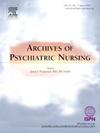Experiences and coping strategies of parents with children diagnosed with autism spectrum disorder in early care with emphasis on social skills and family cultural values: A qualitative study
IF 2.2
4区 医学
Q1 NURSING
引用次数: 0
Abstract
Parents of children diagnosed with autism spectrum disorder (ASD) often experience a grieving process upon receiving the diagnosis. In Spain, early care centers focus on providing care to this population. However, little is known about parents' experiences during this process, the daily challenges they face due to their children's social skills deficits, and how their context and values influence this process. The aim of this study was to explore and describe the experiences of parents of children diagnosed with ASD in early care services, focusing on their children's social skills and the family's cultural values. For this purpose, a semi-structured interview was conducted with 17 parents and a qualitative thematic analysis was made based on the principles of Gadamer's hermeneutic phenomenology. Three main themes could be identified: the emotional process of the parents upon receiving the diagnosis, the unanticipated obstacles and coping strategies they use, and the role of cultural family values that maintain the family dynamics. Part of the findings emphasize the need for greater parental mental health care, the social difficulties faced by both parents and their children, and the importance of support networks and parental values in raising their children.
孤独症谱系障碍患儿家长在早期护理中的经验及应对策略:一项以社交技能和家庭文化价值观为重点的定性研究
被诊断为自闭症谱系障碍(ASD)的孩子的父母在接受诊断后通常会经历一个悲伤的过程。在西班牙,早期护理中心专注于为这一人群提供护理。然而,我们对父母在这一过程中的经历知之甚少,他们每天因孩子的社交技能缺陷而面临的挑战,以及他们的背景和价值观如何影响这一过程。本研究的目的是探索和描述被诊断为自闭症儿童的父母在早期护理服务中的经历,重点关注他们孩子的社交技能和家庭文化价值观。为此,我们对17位家长进行了半结构化访谈,并根据伽达默尔的解释学现象学原理进行了定性主题分析。可以确定三个主要主题:父母在接受诊断时的情感过程,他们使用的意外障碍和应对策略,以及维持家庭动态的文化家庭价值观的作用。部分调查结果强调了加强父母心理健康护理的必要性,父母和孩子都面临的社会困难,以及支持网络和父母价值观在抚养孩子方面的重要性。
本文章由计算机程序翻译,如有差异,请以英文原文为准。
求助全文
约1分钟内获得全文
求助全文
来源期刊
CiteScore
3.70
自引率
0.00%
发文量
131
审稿时长
160 days
期刊介绍:
Archives of Psychiatric Nursing disseminates original, peer-reviewed research that is of interest to psychiatric and mental health care nurses. The field is considered in its broadest perspective, including theory, practice and research applications related to all ages, special populations, settings, and interdisciplinary collaborations in both the public and private sectors. Through critical study, expositions, and review of practice, Archives of Psychiatric Nursing is a medium for clinical scholarship to provide theoretical linkages among diverse areas of practice.

 求助内容:
求助内容: 应助结果提醒方式:
应助结果提醒方式:


